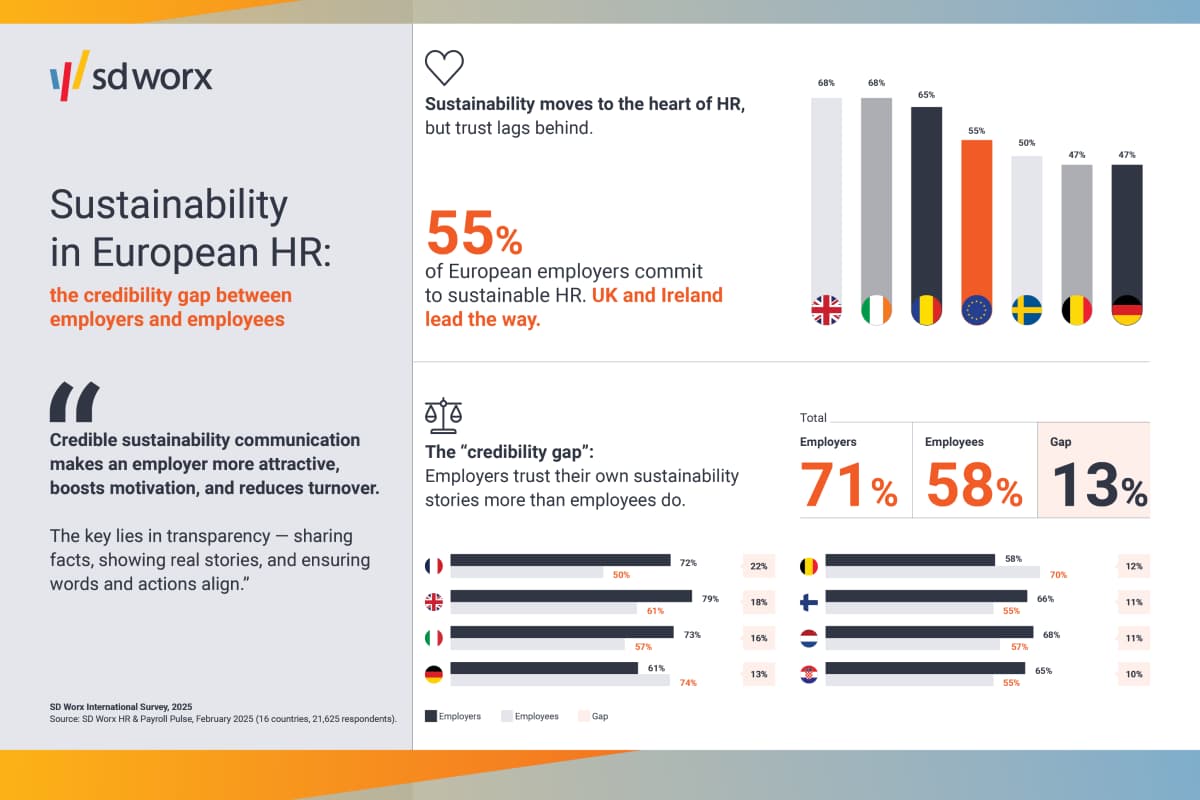55% of European employers integrate sustainability into their HR strategy
Employees are critical: only 58% consider these efforts to be credible
October 28, 2025

More than half of European employers (55%) are committed to integrating sustainability into their HR strategy. Almost three-quarters of employers (71%) also consider their sustainability image to be credible, but employees take a more critical view: only 58% trust their employer's efforts. This is according to recent international research by European HR service provider SD Worx among 5,625 HR managers and 16,000 employees from 16 European countries. The pressure to show credible results is also increasing, now that the European Corporate Sustainability Reporting Directive requires many companies to report openly on their sustainability policies.
Sustainability is becoming increasingly important on the HR agenda. More than half of European employers (55%) are committed to a sustainable HR strategy. The issue is particularly high on the agenda in the United Kingdom (68%), Ireland (68%), and Romania (65%). Countries such as Germany and Belgium (both 47%) continue to lag behind.
How visibly do employers highlight sustainability?
Employers are also increasingly demonstrating their sustainability ambitions to the outside world. Almost three-quarters (74%) publicly promote themselves as sustainable in the way they treat their employees. This is most pronounced in Romania (92%), Norway (85%), and Ireland (81%), while Finland (46%) lags behind. Employees see this profiling less clearly: only 62% believe that their employer is sustainable.
In addition to visibility, reporting also plays a role: 46% of employers say that their organization actively evaluates and reports on its sustainability efforts and ethical impact on the environment, society, and governance (ESG). Around 43% also feel sufficiently prepared for the European CSRD directive. This legislation requires large companies to report on ESG issues from January 2023 onwards.
Credibility gap between employees and employers
Seven out of ten European employers (71%) believe their sustainability image is credible, but employees think differently. Only 58% trust their organization's sustainability efforts. This results in an average gap of around 14 percentage points. The gap is widest in France (22 percentage points), the United Kingdom (17 percentage points), and Italy (16 percentage points), and narrowest in Croatia (10 percentage points), the Netherlands (10 percentage points), and Finland (11 percentage points).
“Employers often strongly believe in their sustainability narrative, but employees experience this less. This creates tension between what organizations mean and how employees experience it,” says Laura De Boom, doctoral researcher at the University of Antwerp. "Fine words or powerful campaigns sometimes strike the right emotional chord, but they don't always match everyday practice. In other cases, employees do feel the values behind the message, but they lack confidence because words are not followed by actions. This is where the challenge lies for HR and communication: not only visibly communicating what you stand for, but also making it tangible in the work and the organizational culture. Only when employees see the promise reflected in their own experience does a sustainability story gain real credibility."

Why credibility matters
This credibility also carries significant weight in the war for talent. Employees who find their organization's sustainability messages authentic, accurate, and credible are 12% more likely to view their employer as attractive. Their job satisfaction increases by 8 to 10%, and they approach their work with 8 to 10% more motivation and passion. At the same time, their willingness to leave the organization decreases by 2 to 2.5%.
“Credible sustainability communication makes an employer more attractive, increases satisfaction and motivation, and reduces the likelihood of people leaving. This applies to everyone, but the effect on satisfaction and motivation is strongest among older employees,” concludes De Boom. "For HR and communications, the key to credible sustainability communication lies in three elements: accuracy, authenticity, and consistency. Share facts and figures, showcase real stories from leaders and employees, and ensure that words and actions reinforce each other. True persuasiveness only arises when sustainability also comes from sincerity—something that not only employees, but increasingly also customers, suppliers, and investors expect."
About the international employee survey
SD Worx, the leading European HR service provider, supports small and large organizations with their HR and payroll challenges. To keep its finger on the pulse of employers and employees, SD Worx regularly conducts in-depth surveys. The analysis of the most recent ‘HR & Payroll Pulse’ provides organizations with valuable insights to sharpen their HR and payroll strategy and make it future-proof.
The survey was conducted in February 2025 in 16 European countries: Belgium, Germany, Finland, France, Ireland, Italy, Croatia, the Netherlands, Norway, Poland, Romania, Serbia, Slovenia, Spain, Sweden, and the United Kingdom by the SD Worx Research Institute. A total of 5,625 employers and 16,000 employees were surveyed. The results provide a representative picture of the labor market in each country.
About SD Worx
SD Worx believes that success starts with people. A thriving workforce doesn’t just build a thriving company, it also contributes to society. Together with its customers, SD Worx sparks successful HR that benefits work, life and society.
As the trusted leading European HR and payroll solutions provider for all organisations and workers, SD Worx delivers software, services and expertise across payroll & reward, human capital management and workforce management. SD Worx has deep roots across Europe and has been leading the way for eight decades together with its customers, employers big and small, to spark employee engagement that ignites success at the heart of their business.
About 95,000 small and large organisations across Europe place their trust in SD Worx. The almost 10,000 colleagues operate in 27 countries. SD Worx calculates the salaries of approximately 6 million employees and ranks among the top five worldwide. It achieved a revenue of EUR 1.180 billion in 2024.
More info on www.sdworx.com / Follow us via LinkedIn
Press contact

